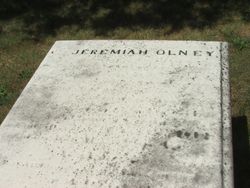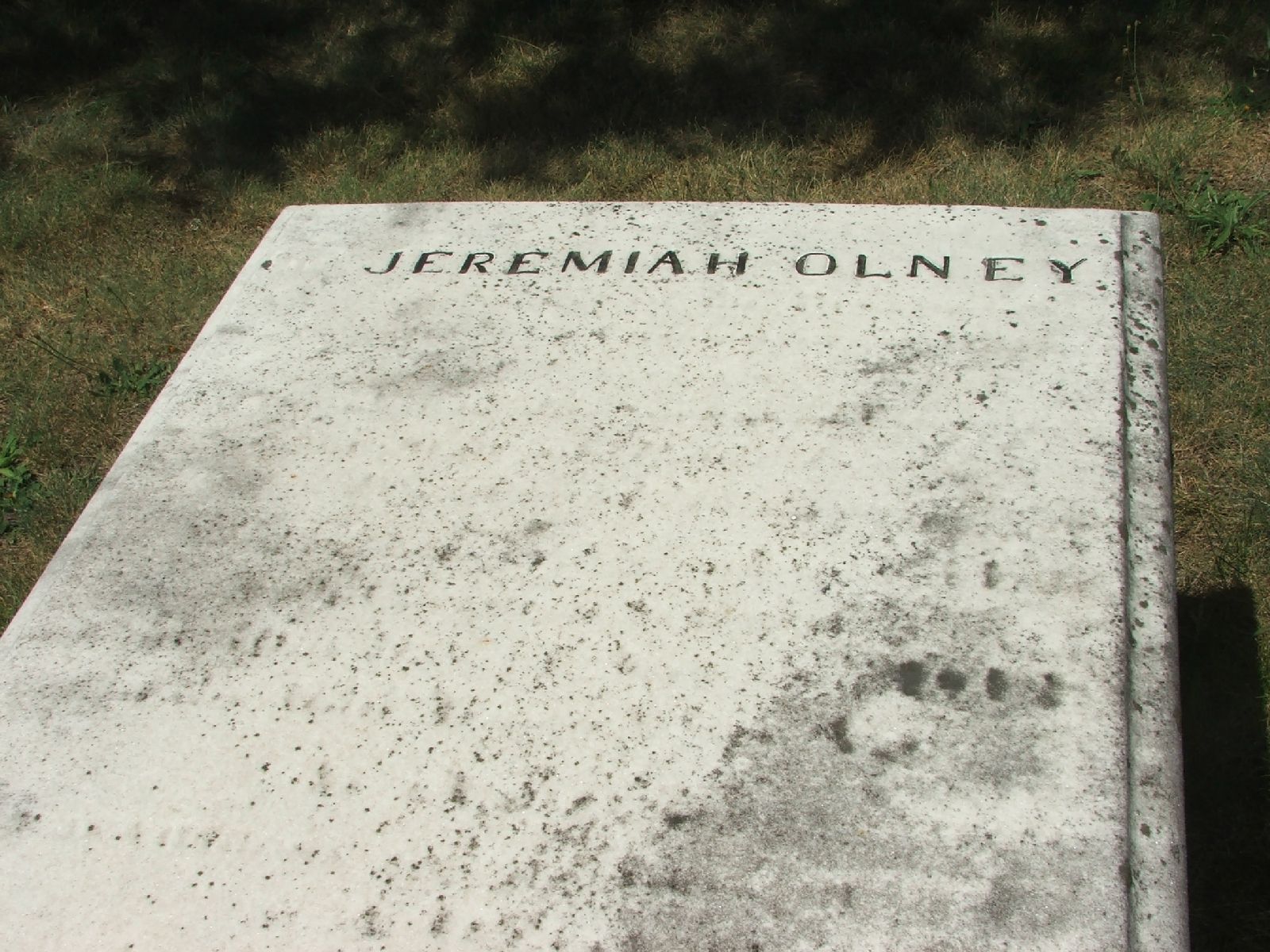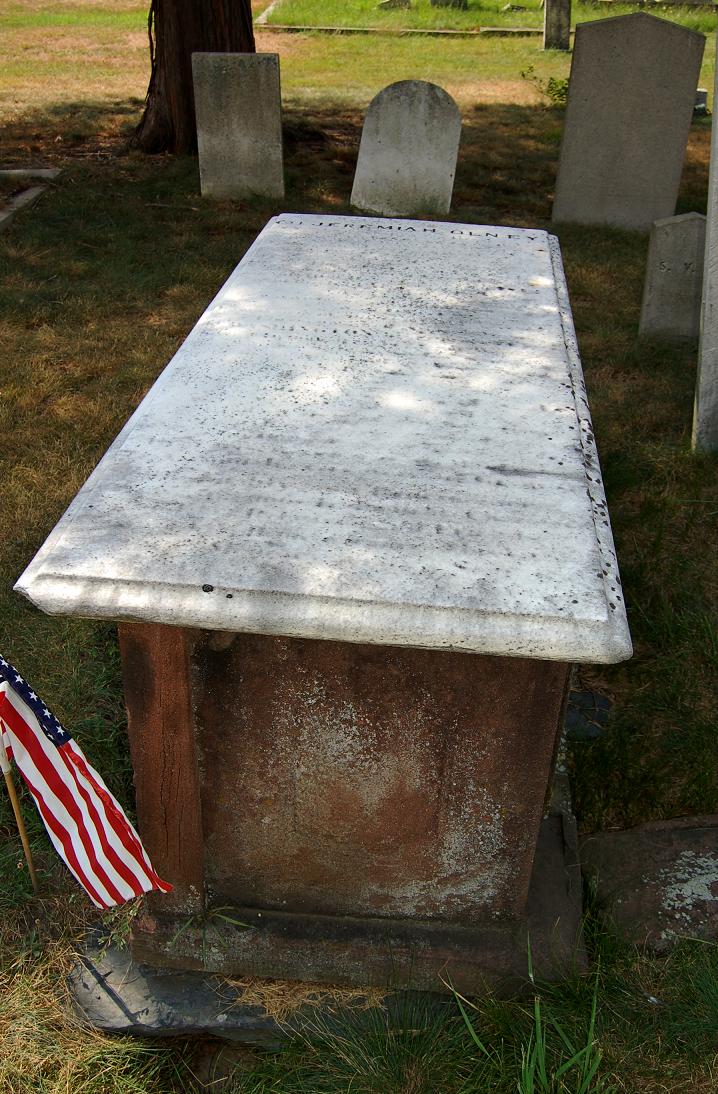Rejecting a captain's commission in the Army of Observation in May of 1775, Jeremiah Olney instead took command of a company in a regiment of the Continental Army, variously known as the 11th Regiment of Foot, Daniel Hitchcock's Regiment, or the Second Rhode Island Regiment. In action with the regiment at Red Bank, Springfield, Monmouth and Yorktown, Olney rose from captain to the rank of lieutenant-colonel. In 1778, the Rhode Island General Assembly voted to raise a "Black Battalion" of slaves, who were offered freedom in exchange for military service. Olney was assigned the task of recruiting this battalion, which was incorporated into his command when he took command of the First Rhode Island Regiment as colonel in 1781.
At the close of the war in 1783, Olney resigned his commission, but remained involved in military affairs. He was a founding member of the Rhode Island Society of the Cincinnati (a veteran's organization), serving as treasurer and later president until his death. He refused to take command of the Rhode Island militia, despite repeated offers. He did, however, assist many veterans in securing pensions, and eventually accepted a post as Distributor of Pensions for Rhode Island Invalid Soldiers. He also spent years after the war seeking reimbursement for regimental debts he had paid out of his own pocket.
Olney was an ardent Federalist, arguing vigorously for Rhode Island's adoption of the Constitution. His interest was personal as well as political; he had lobbied President Washington for the post of Collector of Customs for the Port of Providence, a position he needed to help restore his delicate finances. His support was rewarded after Rhode Island ratified the Constitution, and he served as Customs Collector through 1809. His insistence on the strict application of duty schedules and port fees irritated the shipping community, however, and there were unsuccessful attempts in both 1793 and 1802 to have him removed from office. His resignation in 1809 was precipitated by the Embargo Act, which cut into his income and encouraged open defiance by smugglers. He joined the majority of the state in hostility to the embargo, which he often referred to as the "Fatal Act".
Olney made other efforts to improve his financial condition. Between 1784 and 1812, he managed a farm in Rehoboth, Massachusetts, owned by his wife's family. Between 1786 and 1797, he acted as agent for a group of ex-officers who owned shares in the Annaquatucket Farm in Tiverton, R.I. He invested in property for personal use and for business. One such venture was "Jeremiah Olney's Fountain", located on land north of Providence, from which he sold water to neighboring houses. He was interested in turnpikes (purchasing shares) and in canals (corresponding with Moses Brown about possible routes). He was an active participant in organizing the Providence Theatre, which he defended in print against reformers who claimed that it was an evil influence on the morals of the town. Olney invested in voyages by his brother-in-law Capt. Joseph S. Cooke (b.1746) to Africa and the West Indies, and between the years 1806 and 1811 he owned an interest in the Union Cotton Manufacturing Company in Providence. He also sold lottery tickets and framed prints.
Rejecting a captain's commission in the Army of Observation in May of 1775, Jeremiah Olney instead took command of a company in a regiment of the Continental Army, variously known as the 11th Regiment of Foot, Daniel Hitchcock's Regiment, or the Second Rhode Island Regiment. In action with the regiment at Red Bank, Springfield, Monmouth and Yorktown, Olney rose from captain to the rank of lieutenant-colonel. In 1778, the Rhode Island General Assembly voted to raise a "Black Battalion" of slaves, who were offered freedom in exchange for military service. Olney was assigned the task of recruiting this battalion, which was incorporated into his command when he took command of the First Rhode Island Regiment as colonel in 1781.
At the close of the war in 1783, Olney resigned his commission, but remained involved in military affairs. He was a founding member of the Rhode Island Society of the Cincinnati (a veteran's organization), serving as treasurer and later president until his death. He refused to take command of the Rhode Island militia, despite repeated offers. He did, however, assist many veterans in securing pensions, and eventually accepted a post as Distributor of Pensions for Rhode Island Invalid Soldiers. He also spent years after the war seeking reimbursement for regimental debts he had paid out of his own pocket.
Olney was an ardent Federalist, arguing vigorously for Rhode Island's adoption of the Constitution. His interest was personal as well as political; he had lobbied President Washington for the post of Collector of Customs for the Port of Providence, a position he needed to help restore his delicate finances. His support was rewarded after Rhode Island ratified the Constitution, and he served as Customs Collector through 1809. His insistence on the strict application of duty schedules and port fees irritated the shipping community, however, and there were unsuccessful attempts in both 1793 and 1802 to have him removed from office. His resignation in 1809 was precipitated by the Embargo Act, which cut into his income and encouraged open defiance by smugglers. He joined the majority of the state in hostility to the embargo, which he often referred to as the "Fatal Act".
Olney made other efforts to improve his financial condition. Between 1784 and 1812, he managed a farm in Rehoboth, Massachusetts, owned by his wife's family. Between 1786 and 1797, he acted as agent for a group of ex-officers who owned shares in the Annaquatucket Farm in Tiverton, R.I. He invested in property for personal use and for business. One such venture was "Jeremiah Olney's Fountain", located on land north of Providence, from which he sold water to neighboring houses. He was interested in turnpikes (purchasing shares) and in canals (corresponding with Moses Brown about possible routes). He was an active participant in organizing the Providence Theatre, which he defended in print against reformers who claimed that it was an evil influence on the morals of the town. Olney invested in voyages by his brother-in-law Capt. Joseph S. Cooke (b.1746) to Africa and the West Indies, and between the years 1806 and 1811 he owned an interest in the Union Cotton Manufacturing Company in Providence. He also sold lottery tickets and framed prints.
Family Members
Advertisement
Advertisement

















